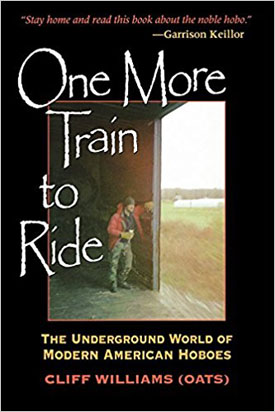This review was written by Craig Clarke.
 What does the average reader really know about the culture of the American hobo? Mostly they keep themselves out of sight due to the misdemeanor status of actions necessary to their survival (e.g., riding on freight trains). Still, there are hundreds of transients constantly traveling, making their way back and forth across the country — riding trains, working where they can, taking handouts, and just enjoying the freedom from society’s strictures. There are two concepts continually raised in the autobiographies of the hobos collected in One More Train to Ride: the above mentioned freedom and the wanderlust that keeps them coming back to this exhausting lifestyle, even after they’ve left it for a while. I found these concepts best presented by a quote from “Adman,” who describes his Philosophy of Hoboing:
What does the average reader really know about the culture of the American hobo? Mostly they keep themselves out of sight due to the misdemeanor status of actions necessary to their survival (e.g., riding on freight trains). Still, there are hundreds of transients constantly traveling, making their way back and forth across the country — riding trains, working where they can, taking handouts, and just enjoying the freedom from society’s strictures. There are two concepts continually raised in the autobiographies of the hobos collected in One More Train to Ride: the above mentioned freedom and the wanderlust that keeps them coming back to this exhausting lifestyle, even after they’ve left it for a while. I found these concepts best presented by a quote from “Adman,” who describes his Philosophy of Hoboing:
It seems like everybody is waiting for their freedom. They’re waiting until they retire so they have enough money to travel where they want to go and buy whatever they want … until they can hop on a Harley and find their freedom on the open road. But there’s only one place you can find freedom. You can’t be free in the past … you can’t be free in the future … the only time you can be free is in this moment.
Collected by part-time hobo and full-time philosophy professor Cliff Williams (whose “hobo moniker” is Oats, in honor of his daily breakfast), One More Train to Ride is by turns moving, saddening, and inspiring. Its contents include poems and songs and the life stories of fourteen hobos, from two teenage girls who dropped out of school to ride the rails (youthful energy is a definite benefit), to septuagenarians who still ride part-time, to some who have achieved celebrity that extends past their own circles (the name “Dante Fucwha” was dropped by no less than three other travelers).
All of the writings collected here give immense insight into the pros and cons of life on the rails, including helpful tips like how to keep your water liquid in the face of freezing temperatures. But none are more so than the poems and songs. The simple lyrical style — following the standard rhyming format, nothing fancy for these folks — seems to lend itself to the emotion inherent in the situation. But the most poignant verse covers an ex-hobo’s longing to return and the experience of watching the trains go by without him. These are the final quatrains of “Softly by Tracks” by Buzz Potter.
As the years roll on by, I still wonder why
I miss her and long for her so
And her name in the end was freedom, my friend
A lover that most never knowThe train passes by and there’s mist in my eye
And it’s not from the soft falling rain
And I know I’ll be back to this place by the track
To watch freedom go by on the train
A lot of hobos leave the life because of changes that have occurred in the quality of people, the lack of respect for others and the land, and the heavier enforcement of the “no riding” laws. The level of freedom is attractive, but the constant struggles just to survive (food, shelter, heat) dampen my desire to ever take up a bedroll myself and follow the tracks. And struggles for food and shelter pale next to the seemingly common occurrence (it was mentioned in two different bios) of near-asphyxiation from diesel fumes when a train goes through a very long tunnel.
So, I won’t be contemplating that career change anytime soon. However, I will be pursuing more information about this underappreciated subculture, its noble inhabitants, and its literature. Sadly, some of the hobos whose writings are collected here have, since Williams last visited them, gone on to “catch the westbound” and were memorialized in that year’s hobo convention — held annually every August in Britt, Iowa.
(Indiana University Press, 2003)
